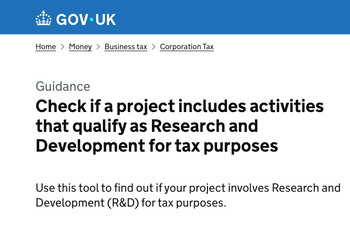How to Respond to an HMRC R&D Enquiry Letter
Expert step-by-step guide: what to do when HMRC opens an enquiry into your R&D tax credit claim
Just Received an HMRC R&D Enquiry Letter?
Your response in the next 48-72 hours is critical. HMRC enquiry letters require strategic, technically robust responses. Poor initial responses often escalate enquiries and can result in full claim denial. This guide explains exactly what to do.
Understanding Your HMRC R&D Enquiry Letter
When HMRC opens an enquiry into your R&D tax credit claim, they'll send a formal enquiry letter (often called a "Compliance Check" or "enquiry opening letter"). This letter marks the start of a formal investigation that can last 6-24 months.
What the Enquiry Letter Means
The enquiry letter will typically:
- Confirm HMRC has opened a formal enquiry into your R&D claim
- Set out initial information requests (though more detailed requests usually follow)
- Specify response deadlines (typically 30 days)
- Name the HMRC inspector handling your case
- Explain your rights and obligations during the enquiry process
Types of HMRC R&D Enquiries
Full Enquiry: HMRC can examine any aspect of your R&D claim and your entire tax return. Most comprehensive and potentially most serious.
Aspect Enquiry: HMRC focuses on specific elements of your claim (e.g., whether certain costs qualify, or whether activities constitute genuine R&D). More limited in scope but can still result in significant claim adjustments.
Compliance Check: Preliminary review of your claim documentation and calculations. Can escalate to a full enquiry if HMRC identifies concerns.
First 48 Hours: Critical Actions Checklist
What you do immediately after receiving HMRC's enquiry letter often determines the enquiry outcome. Follow this checklist:
Immediate Actions (Within 48 Hours)
- Do NOT respond to HMRC immediately - even if the letter requests information urgently, take time to develop a strategic response
- Engage specialist R&D tax support - generic accountants often lack the expertise to handle R&D enquiries effectively
- Preserve ALL documentation - implement a document hold on all R&D-related emails, records, and files
- Review your original claim - identify potential weaknesses or areas HMRC is likely to challenge
- Notify your insurance provider - if you have professional indemnity or tax investigation insurance
- Brief your technical team - ensure engineers/scientists understand an enquiry is underway
- Assess documentation gaps - identify missing contemporaneous records and begin gathering evidence
Document Preservation Protocol
Immediately implement a document hold covering:
- All project documentation, technical specifications, and design records
- Email correspondence relating to R&D projects
- Meeting notes, project plans, and sprint/development logs
- Financial records linking costs to specific R&D activities
- Employment records for staff working on R&D projects
- Subcontractor agreements and invoices
- Any internal communications about the R&D claim preparation
The 7 Critical Mistakes Companies Make
These mistakes often turn straightforward enquiries into prolonged investigations with poor outcomes:
Avoid These Common Errors
- Responding without specialist support - Generic accountants rarely understand R&D tax legislation well enough to defend claims under scrutiny
- Providing too much information - Overwhelming HMRC with hundreds of pages of irrelevant documents obscures key evidence
- Admitting uncertainty about R&D qualification - Tentative language like "we think this might qualify" undermines your position
- Using generic technical descriptions - Vague descriptions that could apply to any company won't demonstrate genuine R&D
- Offering to reduce the claim upfront - Never volunteer adjustments before HMRC challenges specific elements
- Allowing non-technical staff to respond - Technical questions require technically competent responses
- Missing HMRC's deadlines - Late responses suggest disorganisation and give HMRC grounds for penalties
What NOT to Say to HMRC
Avoid these phrases that damage your position:
- "We're not really sure if this qualifies as R&D..."
- "Our previous advisor prepared this claim..."
- "We don't have contemporaneous documentation but..."
- "We can't explain the technical details..."
- "We're happy to reduce the claim to avoid problems..."
- "This is just routine development work..."
Developing Your Response Strategy
A strategic response addresses HMRC's concerns while protecting your claim. Here's the framework:
Analyse HMRC's Questions
Read the enquiry letter carefully. What is HMRC really asking? Are they questioning technical eligibility, cost substantiation, or both? Understanding their concerns helps you develop targeted responses.
Review Your Original Claim
Compare HMRC's questions against your original claim submission. Identify weaknesses, gaps in documentation, or areas where technical descriptions may be insufficient. This allows you to strengthen your position proactively.
Gather Strong Evidence
Compile contemporaneous documentation: project plans, technical specifications, test results, problem-solving records. Strong evidence includes dated records created during the R&D work, not retrospective justifications.
Prepare Technical Narratives
Develop clear, compelling technical descriptions demonstrating genuine R&D advancement. Focus on technological uncertainties, systematic investigation, and advances achieved. Write for HMRC inspectors, not technical peers.
Substantiate Costs
Create full audit trails linking claimed costs to specific R&D projects. Demonstrate how time was tracked, how costs were allocated, and why each cost category qualifies under R&D legislation.
Draft Strategic Response
Your response should be comprehensive but focused. Provide exactly what HMRC requested plus proactive evidence addressing likely follow-up questions. Strategic curation matters more than volume.
What Information to Include in Your Response
Your response should address HMRC's specific questions while demonstrating your claim's validity. Typical requirements include:
Technical Documentation
- Project descriptions - Detailed technical narratives for each R&D project
- Scientific/technological uncertainties - Clear explanation of what was unknown at the project outset
- Systematic investigation methodology - How you approached resolving uncertainties
- Advances achieved - Specific technological or scientific progress made
- Base level of knowledge - What was known in your field before your work
- Contemporaneous records - Dated evidence from during the R&D work
Financial Documentation
- Staff cost calculations - Time tracking, salary records, apportionment methodology
- Subcontractor evidence - Contracts, invoices, scope of work documentation
- Materials and consumables - Receipts, usage logs, allocation to R&D projects
- Software and equipment - Purchase records, depreciation calculations, R&D usage
- Cost allocation methodology - How you identified qualifying expenditure
Strategic Curation Is Essential
Don't overwhelm HMRC with hundreds of pages of unorganised documents. Curate your evidence strategically: provide clear indexing, executive summaries, and direct answers to their questions. Quality and relevance matter more than volume.
Your Legal Obligations and Rights
What You Must Do
- Respond within HMRC's timeframe (usually 30 days, but can request reasonable extensions)
- Provide accurate, truthful information - never misrepresent facts or provide false evidence
- Cooperate with HMRC's investigation - obstructing enquiries can result in penalties
- Preserve records - don't destroy or alter documentation relevant to the enquiry
Your Rights During the Enquiry
- Right to representation - you can appoint a specialist advisor to handle HMRC communications
- Right to reasonable time - you can request extensions for complex information requests
- Right to challenge unreasonable requests - HMRC must justify information demands
- Right to appeal - you can challenge HMRC's final decision through tribunal proceedings
- Right to confidentiality - HMRC must handle your information securely
When to Engage Specialist R&D Enquiry Support
You should engage specialist support immediately if any of these apply:
- Your claim was prepared by a non-specialist or high-volume claims factory
- HMRC's letter suggests they're challenging technical eligibility
- You lack strong contemporaneous documentation
- Your claim value is substantial (£50K+)
- HMRC has made fraud allegations or suggestions
- Your current advisor lacks R&D tax expertise
- You're uncertain about how to demonstrate technical advancement
- HMRC has opened a full enquiry (not just an aspect enquiry)
The Cost of Poor Representation
Companies often try to save money by responding to HMRC themselves or using generic accountants. This frequently results in full claim denial, repayment demands, and penalties that far exceed the cost of specialist support. Invest in proper representation from the start.
Sample Response Framework
While every enquiry is unique, effective responses typically follow this structure:
Cover Letter
Brief, professional covering letter addressing HMRC inspector by name, acknowledging the enquiry, and outlining your response structure.
Executive Summary
1-2 page summary directly answering HMRC's main questions. Make it easy for the inspector to understand your position quickly.
Technical Narratives
Detailed project descriptions (2-4 pages per project) demonstrating R&D qualifying criteria: technological uncertainty, systematic investigation, and advancement.
Financial Documentation
Cost substantiation with clear audit trails. Include schedules, calculations, and supporting documentation.
Appendices
Supporting evidence: project plans, technical specifications, test results, contemporaneous records. Clearly indexed and referenced.
Frequently Asked Questions
How quickly must I respond to an HMRC R&D enquiry letter?
HMRC typically gives you 30 days to respond to an enquiry letter. However, you should engage specialist support within 48 hours to develop a proper response strategy. You can request reasonable extensions, but never ignore HMRC's deadlines as this can lead to automatic adjustments or penalties.
Can I respond to HMRC myself without a specialist?
While you can respond yourself, it's not recommended. HMRC enquiries require technical tax knowledge and strategic communication. Poor responses often escalate enquiries and can result in claim denials. Specialist advisors understand what HMRC is looking for and how to present your case effectively.
What if I don't have contemporaneous documentation?
Lack of contemporaneous records significantly weakens your position but doesn't make defence impossible. You'll need to reconstruct evidence through alternative means: project timelines, email records, version control logs, financial records, and witness statements from technical staff. However, this is considerably more challenging.
Should I meet with HMRC or handle everything in writing?
This depends on your circumstances. Written responses provide clear records and allow careful consideration. Meetings can help build rapport and resolve technical questions more efficiently. Specialist advisors can guide you on the best approach and should attend any meetings with you.
Can HMRC reject my entire claim?
Yes, HMRC can reject claims entirely if they believe activities don't qualify or documentation is insufficient. However, complete rejections are often overturnable with robust technical defence. This is why professional representation is crucial.
Need Help Responding to Your HMRC R&D Enquiry?
If you've received an HMRC R&D enquiry letter, don't respond alone. Get expert guidance on developing a strategic, technically robust response that protects your claim.
Book Urgent Consultation →Or email: steve@iptaxsolutions.co.uk | Call: 0161 961 0096
About Steve Livingston LLB FCA
Steve Livingston is a UK Chartered Accountant and founder of IP Tax Solutions Ltd. With over 20 years' experience defending R&D tax credit claims, Steve has successfully guided hundreds of companies through HMRC enquiries.
After training at KPMG and progressing to Senior Manager, Steve joined Crowe UK as a Tax Partner specialising in R&D tax credits. He now provides boutique, partner-led R&D enquiry defence services.




